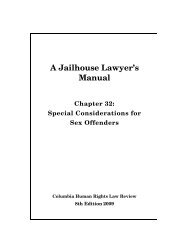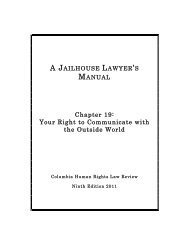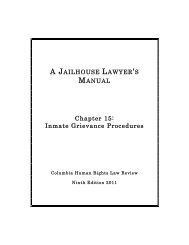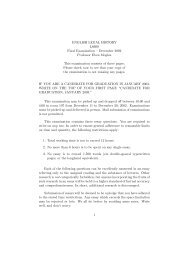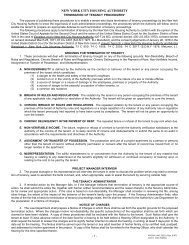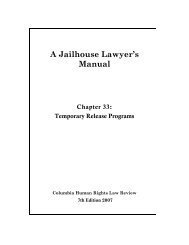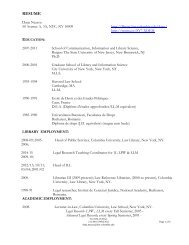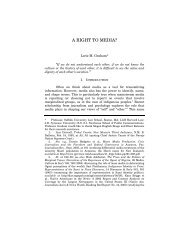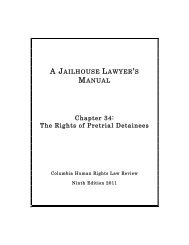The Right to Dignity Rex D. Glensy - Columbia Law School
The Right to Dignity Rex D. Glensy - Columbia Law School
The Right to Dignity Rex D. Glensy - Columbia Law School
Create successful ePaper yourself
Turn your PDF publications into a flip-book with our unique Google optimized e-Paper software.
2011] <strong>The</strong> <strong>Right</strong> <strong>to</strong> <strong>Dignity</strong> 93<br />
erratic within the selfcontained doctrine of a single amendment.<br />
Nevertheless, dignity is routinely invoked <strong>to</strong> make extremely<br />
foundational points that range from the notion that the right <strong>to</strong><br />
dignity is the underlying source of some of the most important rights<br />
in the Bill of <strong>Right</strong>s and the Reconstruction Amendments, <strong>to</strong><br />
statements that dignity is the motivating force behind the whole<br />
Constitution itself: “the essential dignity and worth of every human<br />
being [is] a concept at the root of any decent system of ordered<br />
liberty.” 135 Thus, under the rubric of dignity rights, we have observed<br />
dignity as a barrier <strong>to</strong> illicit state behavior, dignity as au<strong>to</strong>nomy,<br />
dignity as liberty, dignity as respect, and dignity as basic decency.<br />
From all of these different strands, the right <strong>to</strong> dignity emerges as an<br />
ideational core that is synonymous with a certain purity of purpose<br />
that breathes life in<strong>to</strong> the constitutional text. Moreover, while it<br />
might sometimes be understated or not stated at all, it is undeniably<br />
present within the judicial interpretation of some of the<br />
Constitution’s most vital provisions.<br />
<strong>The</strong> federal constitution is not the only impetus behind the<br />
judicial conversation pertaining <strong>to</strong> the right <strong>to</strong> dignity. Some state<br />
constitutions, such as those of Illinois, 136 Louisiana, 137 and Montana 138<br />
the premise of individual dignity and choice upon which our political system<br />
rests”); Goldberg v. Kelly, 397 U.S. 254, 264–65 (1970) (holding that procedural<br />
due process requires a pretermination hearing for welfare recipients because of<br />
the United States’ “basic commitment . . . <strong>to</strong> foster the dignity and wellbeing of<br />
all persons within its borders”); Miranda v. Arizona, 384 U.S. 436, 457, 460 (1966)<br />
(stating that “the constitutional foundation underlying the privilege [against self<br />
incrimination] is the respect a government . . . must accord <strong>to</strong> the dignity and<br />
integrity of its citizens,” and emotional pressure exerted on a suspect in cus<strong>to</strong>dy is<br />
“destructive of human dignity”); United States v. Balysis, 524 U.S. 666, 713<br />
(noting that “the privilege [against self incrimination] recognizes the<br />
unseemliness, the insult <strong>to</strong> human dignity, created when a person must convict<br />
himself out of his own mouth . . . .”) (Breyer, J., dissenting); Cruzan v. Missouri,<br />
497 U.S. 261, 302 (arguing that individuals should have a substantive due process<br />
right “<strong>to</strong> die with dignity”) (Brennan, J., dissenting).<br />
135. Rosenblatt v. Baer, 383 U.S. 75, 92 (1966) (Stewart, J., concurring); see<br />
also William J. Brennan, Jr., <strong>The</strong> Constitution of the United States: Contemporary<br />
Ratification, 27 S. Tex. L. Rev. 433, 438 (1986) (stating that the Constitution “is a<br />
sublime oration on the dignity of man, a bold commitment by a people <strong>to</strong> the ideal<br />
of libertarian dignity protected through law”).<br />
136. See Ill. Const. art. I, § 8.1(a)(1) (“Crime victims . . . shall have the . . .<br />
right <strong>to</strong> be treated with fairness and respect for their dignity and privacy<br />
throughout the criminal justice process”); Ill. Const. art. I, § 20 (“To promote<br />
individual dignity, communications that portray criminality, depravity or lack of<br />
virtue in, or that incite violence, hatred, abuse or hostility <strong>to</strong>ward, a person or



